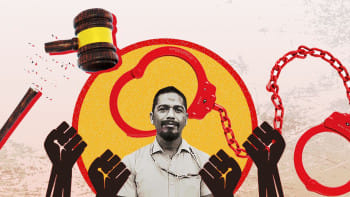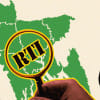Right to information takes centre stage in Indian elections

India's right to information (RTI) regime has been going through a rough patch since the Bhartiya Janata party (BJP) government of Prime Minister Narendra Modi took office in May 2014. RTI activists and informed citizens are concerned that the government is weakening the power of the law. One illustration of this is the delay in nominating information commissioners, leading to a huge backlog of requests. In August last year, opposition Indian National Congress President Mallikarjun Kharge accused the government of "killing the RTI Act bit by bit," adding that it is "not just an attack on the constitutional right, but another step in the conspiracy to end democracy."
Against this backdrop, the unanimous decision on February 15, 2024 of a five-judge Constitution Bench of the Indian Supreme Court, led by its chief justice, to strike down the now infamous Electoral Bonds Scheme of 2018 and order the disclosure of a huge amount of sensitive information hitherto concealed from citizens came as a shot in the arm of India's RTI Act, 2005. In Bangladesh, there is much to learn about the enormous potential of our own RTI Act, 2009 from the Indian experience.
Knowledgeable observers of the Indian political scene consider the Supreme Court decision and the unfolding revelations emerging from it to be a watershed moment for the country. Many believe that it will impact the ongoing general elections in the country as it exposes the close nexus between big corporations which bought and gifted the bonds and the political parties which benefited from them. The latter must now face close scrutiny from the electorate.
Electoral Bonds are like promissory notes that individual Indians or corporations could buy under the scheme from the State Bank of India (SBI) and give them as donations to political parties of their choice. The scheme was promoted by the government ostensibly to increase transparency in political financing by facilitating anonymous donations to political parties, as a better alternative to cash donations. It was introduced through three key amendments in the Finance Act approved by the BJP-dominated parliament in 2017. The amendments included specific sections of the Representation of the People Act, Companies Act, and the Income Tax Act. They were primarily aimed at ensuring that all key information relating to the identity of the buyer or payee of the bonds would remain concealed.
Political analysts, civil society leaders and RTI activists of the country immediately sounded the alarm. They claimed that the amendments were unconstitutional as they violated citizens' right to information enshrined in the constitution, and that the anonymity provided fostered corruption and upset the level playing field among political parties. As a result, soon after the Electoral Bond Scheme was set rolling, in January 2018, a coalition of non-governmental organisations—Association for Democratic Reforms and Common Cause—together with the Communist Party of India submitted a public interest litigation (PIL) petition at the Supreme Court to challenge the constitutionality of the amendments and the Electoral Bond Scheme as a whole.
Revelations of such a consequential nature underline the importance of citizens' role in exercising their right to information as watchdogs of good governance. The landmark judgment of the Indian Supreme Court on the Electoral Bond Scheme also highlighted the role of the judiciary. In Bangladesh, we are yet to discover the full potential of our RTI Act as it is seldom used by our civil and political elites to probe larger issues of governance.
The Supreme Court was thus faced with the following issues: is the Electoral Bond Scheme constitutional? Does it violate citizen's right to information? Can the scheme allow anonymity to protect donors' right to privacy? Does the scheme compromise the democratic process, and free and fair elections?
After years of study and deliberation, the February 2024 decision of the Supreme Court was clear and unambiguous. It held that due to its anonymous nature, the Electoral Bond Scheme violated citizens' right to information and affected free speech and expression under the constitution. "Information about funding to a political party is essential for a voter to exercise their freedom to vote in an effective manner," the court said. It thereby addressed a major concern of the petitioners—that electoral bonds allow donors and political parties to keep their association hidden from the public and thereby from the purview of the Right to Information Act. The verdict came as a boost to India's RTI Act.
At the hearings, the government argued for the necessity to protect the right to privacy of big corporate donors to political parties. However, the court held that the right to privacy of political affiliation did not extend to contributions made to influence public policy. It ruled that information about corporate contributors through electoral bonds must be disclosed.
The Supreme Court directive to the SBI to furnish the Election Commission of India with details of all donations through electoral bonds, including the identities of donors and the political parties that received the contributions, led to the unearthing of what many observers called "one of the biggest ever scams in India." Collating information on electoral bond transactions obtained through various sources show that since the inception until its closure, electoral bonds worth a total of around of around 16,490 crore rupees were bought and given to different political parties. Of this amount, the BJP received more than half, the Indian National Congress received close to 11 percent, and the All India Trinamool Congress about 10 percent. The rest were shared by 19 other parties.
Advocate Prashant Bhushan, a well-known RTI expert of India and the lead lawyer for the petitioners' case in the Supreme Court, claimed at a recent meeting that the scale of corruption went far beyond the amount that the ruling BJP received through electoral bonds. Contracts and projects worth lakhs of crores were awarded quid pro quo. He cited case studies based on data released after the Supreme Court directive, revealing circumstantial evidence that points to "illicit kickbacks funnelled through electoral bonds from corporations to political parties in exchange for lucrative favours."
In one such case study, Vedanta Limited, an Indian company which made hefty donations to the ruling party, was subsequently chosen to be the preferred bidder for several mining licences. Other case studies illustrate how the Electoral Bond Scheme served as a cloak for clandestine corporate lobbying. This is only the beginning as more such scandals are unearthed.
Revelations of such a consequential nature underline the importance of citizens' role in exercising their right to information as watchdogs of good governance. The landmark judgment of the Indian Supreme Court on the Electoral Bond Scheme also highlighted the role of the judiciary. In Bangladesh, we are yet to discover the full potential of our RTI Act as it is seldom used by our civil and political elites to probe larger issues of governance. Only by doing so can we identify points of law which may benefit from the interpretation of our higher judiciary.
Dr Shamsul Bari and Ruhi Naz are chairman and assistant director (RTI), respectively, of Research Initiatives, Bangladesh (RIB). They can be reached at [email protected].
Views expressed in this article are the authors' own.
Follow The Daily Star Opinion on Facebook for the latest opinions, commentaries and analyses by experts and professionals. To contribute your article or letter to The Daily Star Opinion, see our guidelines for submission.

 For all latest news, follow The Daily Star's Google News channel.
For all latest news, follow The Daily Star's Google News channel. 











Comments